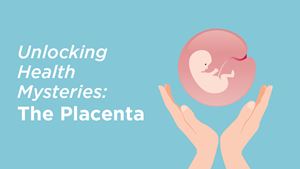
As your baby grows throughout your pregnancy, so too does the placenta – a temporary organ that provides a connection between you and your baby, delivering essential nutrients, oxygen and antibodies. The placenta also works in the reverse, removing carbon dioxide and waste from the baby’s blood back to your blood. And, it produces hormones that help support your pregnancy and the baby’s growth.
Dr. William Fletcher, an obstetrics and gynecology specialist at Rochester Regional Health’s Unity Hospital explains that the placenta also helps to keep the baby safe and can be an indicator for possible issues.
“The placenta not only helps your baby to grow, but also plays a protective role by shielding your baby from many, but not all, types of harmful bacteria and viruses,” he said.
The placenta has been called the “black box” of pregnancy, helping teams to understand what may have gone wrong in cases of unforeseen complications. A November 2020 study indicated that in cases of preeclampsia, growth restriction, and preterm birth, analysis of the placenta after delivery may serve as a “crystal ball” – potentially helping obstetricians and maternal-fetal medicine specialists better predict similar complications in future pregnancies.
“We can monitor placental function throughout pregnancy in a few different ways. The most common example is using uterine measurements or ultrasounds to make sure that your baby is growing appropriately as the pregnancy progresses,” said Dr. Fletcher. “Another example is measuring the amniotic fluid around the baby. If this measurement were found to be decreased, that might be a clue that the placenta isn’t working the way it should be. Your provider then would take extra steps to help ensure the remainder of your pregnancy is as safe as possible.”
Pregnant women are at risk for severe illness from COVID-19, according to a recent CDC study that showed that being pregnant with symptomatic COVID-19 can triple your likelihood of being admitted to an ICU. Pregnant women with COVID-19 may also have higher risk of dying from COVID related complications compared to non-pregnant women of similar ages who get COVID.
While the rates of women transmitting COVID-19 infection to their baby during pregnancy have been low, early research shows that COVID-19 can penetrate the placenta and may increase the risk of preterm birth and other adverse pregnancy outcomes.
Because the placenta can pass antibodies from a pregnant person to their baby, vaccination during pregnancy appears to carry benefit for babies, as babies born to individuals who got the vaccine while pregnant passively received antibodies against COVID-19, though it’s unclear how long these antibodies may last after birth.
“The data is getting more robust by the month but at this point, there have been no substantial risks found for pregnant moms who have gotten vaccinated during pregnancy or their babies when compared to prior to the COVID-19 pandemic,” said Dr. Fletcher. “Talk to your provider about your risk and whether getting the vaccine is right for you.”
The American College of Obstetricians and Gynecologists, the Centers for Disease Control and organizations across the world have recommended that the COVID-19 vaccines not be withheld from pregnant people.